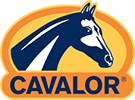A healthy horse with a gleaming coat: that’s what all owners want. But how can we get our horse in that condition? Is it just a question of applying a shampoo or spray, or is more involved?
The condition of the coat reflects your horse’s health
A horse that looks great on the outside is healthy on the inside too. Care products are certainly useful to enhance a lovely appearance, but can’t replace the true sheen that comes from within. A healthy horse efficiently absorbs energy and nutrients from its feed, feels comfortable and the condition of its coat will reflect its general health.
Mental and physical health are inextricably linked
A horse’s physical health is determined by an ingenious system – the immune system. The gastrointestinal tract is an important link in this system. A healthy digestive system is the first step towards a healthy horse.
Horses don’t just rely on their physical state of health to help combat pathogens; their mental health is also a contributing factor in disease resistance. Stress, for example, impacts immensely on equine health, so always take the mental wellbeing of your horse into consideration. Ensure your horse has enough access to the meadow and social contacts, and avoid boredom and frustration.
The immune system is about mental and physical health
Intestines as a measure of health
The development of a healthy GI system starts just after birth. As soon as a foal starts to drink colostrum (the first milk a mare gives to her foal) it acquires immunity through antibodies entering the bloodstream, but bacteria – both beneficial and harmful – also start to colonise the large intestine. Bacteria that are beneficial to intestinal health are permitted to stay and are called bacterial flora or microflora. There are also strains of bacteria with a negative impact on health. These bacteria are called pathogens and are expelled. Once the beneficial bacteria have colonised the intestines they co-exist in harmony with their host: the horse. In fact, they are mutually dependent for survival. Nature intended horses to graze and digest fibre all day long. However, they need the help of the microbial population to help with difficult to digest plant material. These bacteria break down the fibres into volatile fatty acids that supply horses with a large quantity of energy. These fatty acids also have a significant influence on cell health, and consequently on the horse’s general health.
Fatty acids come in various types. Microflora can create certain fatty acids themselves, while the horse has to absorb others via its feed or supplements. Everyone knows omega 3, 6 and 9 fatty acids. What is important is not only the quantity of these fatty acids, but the relationship between them. Horses are naturally accustomed to a diet rich in omega 3. After all, they are grazing animals and grass has a very high content of these fatty acids. Grains, on the other hand, are rich in omega 6 and contain a very low concentration of omega 3 fatty acids. The rations currently fed to horses therefore tend to be rich in omega 6, while in natural conditions the diet would be rich in omega 3. Current feeding habits actually mean there is a disruptive balance between omega 3 and omega 6 fatty acids. This makes it very important to feed your horse products that offer the right balance of omega 3 and omega 6. An extremely easy way of achieving this is to put your horse out to pasture during summer, and add extra omega 3 fatty acids to the diet in winter in the form of supplements or oils, for instance. A word of caution – not all oils are suitable for this purpose. Sunflower oil and maize oil are, for example, high in omega 6 fatty acids, while linseed oil, rapeseed oil and fish oil contain high levels of omega 3 fatty acids.
Horses are naturally accustomed to a diet rich in omega 3
Although less attention is devoted to omega 9 fatty acids, they are still very important. These fatty acids play a role in prostaglandin production and are also crucial to cell functioning among other things. Contrary to the other fatty acids, a horse can manufacture omega 9 fatty acids in the body, so giving this in the form of a supplement is not strictly necessary. The production of omega 9 fatty acids is however influenced by the balance of omega 3 and omega 6 fatty acids in the body.
Supplements can support extra good health
Most horse owners are happy to give their cherished animals a little extra boost. Some extra vitamins and minerals in addition to their normal feed ration just to be on the safe side. And that raises the eternal question: is it really necessary?
When a horse is fed a compound feed ration that already contains enough vitamins and minerals, providing extra vitamins and minerals makes little sense. What is important is to keep to the recommended ration stated on the packaging and check that B vitamins have been added to the feed, as this is not always the case. Using a vitamin or mineral supplement is not necessary provided your brand of compound feed contains B vitamins and you stick to the recommended ration. It is key that the horse is healthy and able to absorb everything offered in the rations. Supporting the large intestine function is therefore preferable to adding extra vitamins and minerals. You can give your horse all the supplements you like, but if the large intestine is not functioning properly and the horse is unable to absorb any goodness, the benefits will not be experienced. If you are considering adding oil to your horse’s feed ration it is advisable to use one that contains sufficient omega 3 fatty acids; e.g. linseed or rapeseed oil or better still: a combination of various oils. It is very important that horses intake sufficient nutrients, particularly at susceptible times such as coat shedding. Supporting the large intestine in the form of an extra supply of omega 3 fatty acids can certainly be beneficial at this time.
Sometimes they are in need for some extra help
Dealing with undesirable disruptions to the GI system
A change of diet, excess sugar and starch, moulds, antibiotics, mycotoxins and many other factors can disrupt the harmonious balance in the large intestine. Harmful bacteria can gain control at such times and cause unbalanced fermentation. Take as an example horses that eat maize silage: they will have a higher concentration of lactic acid producing bacteria in their large intestine, which can cause acidification. Disruption of this nature is not only detrimental to digestion, but also reduces the intake and conversion process of nutrients. A love of stability is a factor that typifies microflora in the large intestine. They don’t think it’s boring eating the same hay and same feed everyday – on the contrary, it helps keep your horse in balance. But many owners project their own feelings on to their animals. As we humans enjoy a varied diet, we often wrongly assume that our horse likes variety too. And that’s why you occasionally give your horse a mash or an extra treat. You like to spoil your horse and it strengthens your bond. But it remains purely and simply a treat. The daily ration is what really makes all the difference to your horse’s overall health and wellbeing.
If the large intestine function is disrupted, certain nutrients can fortunately restore the balance in the intestines, such as prebiotics and probiotics and certain fatty acids. Prebiotics and probiotics support the beneficial bacteria in the intestines so the harmful bacteria are prevented from disrupting intestinal health. This is similar to the working of yogurt and yeast tablets humans use to support their intestinal health. It is also a good idea to give horses prebiotics and probiotics after they have been ill or been administered antibiotics.
Advice from our nutritionists:
- Ensure an adequate intake of fibers. A horse should consume at least 1.25% of its body weight in dry matter from roughage. Not only does roughage contain a lot of fibers, but concentrates can also contain fibers. Cavalor FiberForce is a muesli with a high fiber content and long fibers for a balanced gut function.
- Add pre- and probiotics to the diet, as they support the gut microbiome. Probiotics are microbes that can stabilize digestive disorders. Prebiotics are food for the good microbes. By feeding Cavalor Vitaflora, you restore balance to the microbiome in the colon and let your horse shine from the inside out.
- Provide a mix of omega-3, omega-6, and vitamin E fatty acids, such as Cavalor OilMega. This is a plant-based boost that supports the gut flora and the immune system. It also promotes a shiny coat and helps with shedding.
If you really want the best for your horse, go easy on the supplements and give your animal what it really needs. To ensure you are giving your horse the right feed, we advise having an equine nutritionist check the composition of the ration.



